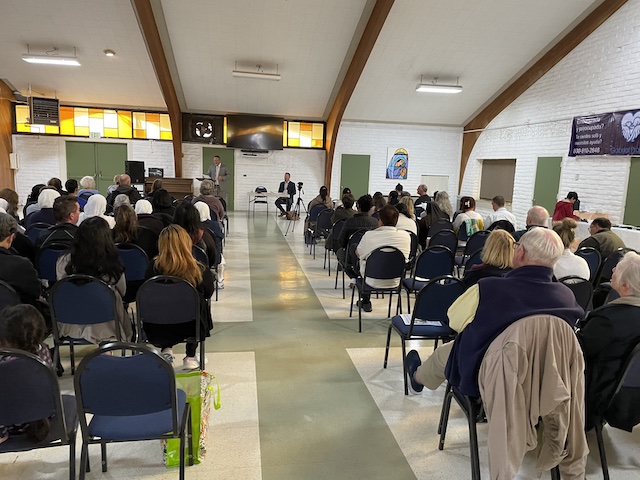
Experts: Parents Rights are key religious freedom, cornerstone of social justice
By Valerie Schmalz
Any California parent with a child who is a student in school can suddenly find that the parent’s very right to make key decisions for his or her child is endangered.
An avalanche of legislation from Sacramento, passed and in the works, aims to remove parents from decisions ranging from what their children learn in school to whether they can independently decide to identify as another sex. Already in California children can obtain birth control and procure abortions from clinics the age of 12, without the knowledge or permission of parents.
However, the U.S. Constitution, U.S. case law, natural law and Catholic teaching are on the side of parents’ rights, two experts told a room full of parents and others at Mater Dolorosa Parish in South San Francisco during Religious Freedom Week on June 22. The talk was titled “Parental Rights & Religious Freedom: Where do we stand? What can we do?”, and sponsored by the Archdiocesan Office of Human Life & Dignity.

“You all have a responsibility to be civically active,” California Policy Center Vice President for Education Policy & Government Affairs Lance Christensen told those assembled. “The First Amendment of the United States Constitution says this, ‘Congress shall make no law respecting an establishment of religion, or prohibiting the free exercise thereof or bridging the freedom of speech or of the press or the right of the people to peaceably assemble.’”
“Citizens have lots of rights in those few words,” said Christensen, who noted he is a seventh generation Californian, a member of the Church of Latter-Day Saints and married with five children who attend public school in Central California.
With 6,000 political jurisdictions, from state senate and assembly districts to city council and water boards, there are many places for people of faith to become active in California. The Brown Act requires open meetings and gives citizens the right to speak at those meetings, Christensen said. He urged attending the meetings and supporting people of faith running for office at local levels, particularly for school boards. And Christensen urged those present not to give up on California.
The Catholic Church clearly teaches that parents are the primary educators of their children and that is a right no government can take away, said Ryan Mayer, director of Catholic Identity Assessment and Formation for the Archdiocese of San Francisco. That principle is also grounded in reason and therefore parents’ rights to educate their children can be argued without reference to religion, Mayer said.
Further, U.S. case law has been very clear about the rights of parents to educate their children, Mayer said.
“Parents are prior to any state. This is a right that comes from God and as such it is a natural right. It’s a right that belongs by nature to parents as parents. That means it’s something that even though it’s also a religious principle, it’s also a religious freedom,” said Mayer, who is married with four young children.
In addition to canon law, the 1983 Charter for the Rights of Family from the Holy See is very clear, he said, and lists a number of rights that belong to parents as primary educators.
Both Christensen and Mayer said the solution for parents to control their children’s education is some form of school choice. Catholic and private schools are largely out of reach of most people because of the cost, Mayer said. The Church teaches it is a matter of social justice that the state fund religious schools.
Recent U.S. Supreme Court rulings have supported the use of taxpayer money to pay educational costs for all children, not just those in public schools, said Christensen. In a number of states, various forms of school choice have been and are being enacted. So far, the concept has not gotten very far in California for various reasons, including lack of education of Catholics on their rights and strong opposition by the public-school teachers’ union.
Raising the subject is the first step, Mayer said.
“Be an advocate for school choice, especially in California. This is a matter of Catholic social teaching. For Catholics, we absolutely should be advocating for school choice,” said Mayer.
“One of the biggest scandals in Catholic education is the cost of Catholic education for some families. In some cases, a year of high school costs 20, $25,000 a year. That’s insane. How do you do that? I have no idea how one does that. … The Catholic church teaches you actually have a right to those subsidies. And advocate for others to be advocates for school choice. Because again, most people don’t know this.”
“This is what the church teaches,” said Mayer, “and it’s actually a matter of social justice, Catholic social teaching.”
The talk was one of two Archdiocese of San Francisco events sponsored by the Office of Human Life & Dignity during Religious Freedom Week, June 22-29. The U.S. Conference of Catholic Bishops created the annual weeklong recognition of religious liberty which begins on the Memorial of English martyrs St. Thomas More and St. John Fischer and concludes on the Memorial of Sts.Peter and Paul.
More information courtesy Ryan Mayer: Religious Freedom & Parental Rights in Education, Selected Quotations; Charter for the Rights of the Family, Article 5

